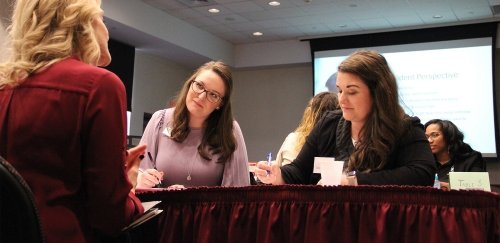CSA 505 - Professional Helping in College Student Affairs: Exposes students to components of professional helping with a focus on the college student and their setting. Incorporating active use of helping skills through role playing, students will apply a three-stage helping model to interactions with college students. In addition, students will examine student mental health disorders, culturally responsive helping, reflective practice, crisis counseling, and legal and ethical issues. Primarily an in-person course, some sessions may be offered via distance education.
CSA 515 - Small Group Leadership in Student Affairs: Examines leadership of small groups that occur in student affairs and higher education. Topics include group development and dynamics, culturally competent group leadership, legal and ethical issues, power considerations, facilitation techniques, planning, and assessment. Students will also explore leadership of experiential activities, committee and task groups, and student organizations.
CSA 522 - Foundations and Functions of College Student Affairs: Provides a comprehensive introduction to the field of college student affairs and its role in American higher education. This course examines the underpinnings of the college student affairs profession specifically, and higher education generally, including history, philosophy, roles, and functions. Students will also explore institutional and student demographics; analyze the influence of mission, curriculum, and organizational type on the nature of student affairs work; and consider essential partnerships with stakeholders in CSA work.
CSA 521 - Student Development Theory: Examines and critiques college student development theories and how the college experience shapes the formation of one’s identity. In keeping with our scholar-practitioner model, this course also applies these theories and models to current college students and considers their use in student affairs administration. This course is foundational to the Educational Leadership and College Student Affairs graduate program and aligns with the Council for the Advancements of Standards.
CSA 523 - Assessment & The College Student Experience: Provides a comprehensive examination of the experiences of post-secondary students including the nature and characteristics of the population, the effects and outcomes of college, the roles and responsibilities of student affairs practitioners in measuring programmatic outcomes, and step-by-step procedures for assessing student learning.
CSA 524 - Ethical, Legal, and Leadership Issues in College Student Affairs: Examines and critiques an array of contemporary issues in college student affairs specifically and higher education in general. This course emphasizes the ethical, legal, and leadership issues present in real case studies and how these concepts relate to and influence college student affairs practice.
CSA 525 - Multicultural Counseling Competency: Focuses students' attention to the presence of personal resistance, biases, prejudices, stereotypes, judgmental thought processes, and racist tendencies in society and how that affects practicing counselors and student affairs professionals. The development of knowledge and understanding regarding characteristics and concerns of diverse populations, the attitudes and behaviors affected by dominant group membership, and the individual and group approaches/interventions appropriate within the multicultural helping settings will be explored.
CSA 530 - Special Topics in Higher Education: Provides graduate students with in-depth instruction and student research within selected areas of interest not available in other courses. Topics may include a continuation of coursework beyond what is offered in a selected course or an intensive look at a topic such as Title IX, campus safety, higher education governance crises, equity and access to education, under-represented populations, and multicultural competence. Requires extensive reading and development of the students' ideas on the topic, and expression of those ideas in written and oral form. Students may take this course up to two times with different topics
EDLD 500 - Introduction to Educational Leadership: Provides students with rudimentary foundations regarding the functions and tasks of educational leadership. Issues include leadership theory; the evolving school and college setting; the meaning, development, and work of school and college administrators; educational systems analysis; school and college personnel administration; and career ladders in educational administration.
EDLD 501 - Organizational Behavior & Program Development: Explores the various attributes and impacts of organizational behavior with a core focus on effectively creating programs and leading change within an organization. Main topics included are: vision, mission, communication, conflict, renewal, accountability, power, building capacity, change, culture, emotional intelligence, and professional development. Using needs assessment data for action planning for effective program implementation is established.
EDLD 590 - Educational Research & Writing: Examines various concepts, theories, and methods related to research in an educational setting. Students will review, analyze, and critique existing qualitative, quantitative, and mixed methods research. Students will also develop and refine their educational writing through course assignments and completion of a comprehensive, professionally relevant literature review.


